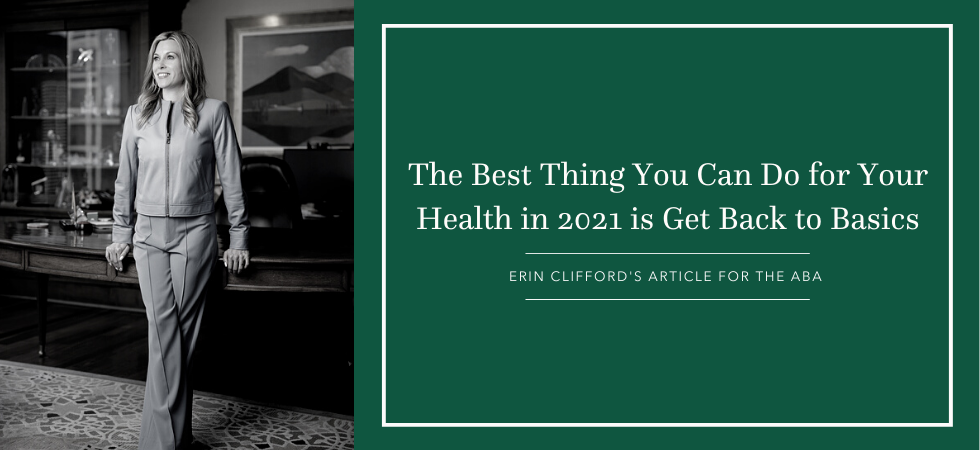This unprecedented time has dictated a major shift in our routines – including working from home and, for some, helping children learn from home on top of that – which has led to a neglect in routine habits that have kept us physically and mentally healthy, such as going to the gym or meeting friends for a long lunch to relax and unwind. As such, studies have shown that in 2020 Americans suffered both in physical health (weight gain) and mental health (depression, anxiety, substance abuse, and suicide have risen).
Erin Clifford, partner at Clifford Law Offices, is a passionate advocate about living healthfully. She has coached many individuals and attorneys about the importance of making sure their physical and mental health needs are met first so that they will be better at taking care of others including colleagues, clients, friends, and family members. But how can we add this to our already very busy lives?
The answer, according to Erin, is to make 2021 the year of getting back to basics. With all the changes we have incurred, it is not the time to set overarching goals that will cause frustration and, most likely, be abandoned. Instead, start by making small, healthy changes to your lifestyle that will eventually lead to habits that will build on one another.
Erin penned an article for the American Bar Association (ABA) that is geared towards helping lawyers, and others, get back to basic health habits to build a long-lasting foundation where, eventually, bigger health goals can be set.
A synopsis of her tips follow.
Get Moving
Make physical health your priority as it affects your sleep, energy, emotions, and even sets the tone for an entire day. If you’re just getting started or re-starting your physical fitness routine, commit to a simple exercise regimen that happens a few days per week.
Design Your Plate
Fad diets are appealing as a quick fix, but usually not sustainable. While we may be able to eliminate certain foods or food groups from our plate for some time, realistically we are not able to keep doing this for the rest of our lives. Instead, design your plate at mealtime to be made up of half vegetables, one quarter protein, and one quarter of another item, such as grains or potatoes.
Pause
The pandemic has taken a serious toll on our mental health, including symptoms of anxiety or depressive disorder, trauma- and stressor-related disorder, and substance abuse.
One way to help alleviate feelings of stress or the worries running through your mind is to pause. Simply stop what you are doing and sit quietly. Start with five minutes and work your way up to 15 minutes. Set a timer to remind you to take a time-out a few times a day. Somehow removing yourself from everything – even for a few moments – can be beneficial for your mental wellbeing.
Note: Many mental health conditions may require medical care so it’s a good idea to speak with your doctor if you are experiencing serious symptoms or have concerns.
Drink Less
Finally, the pandemic has seen an uptick in drinking for many. Drinking alcohol can subject you to irritability and mood swings (short term), and depression, anxiety, cognitive impairment, and, in extreme cases, permanent brain damage (long term effects). Plus, it does not help you get a better night’s sleep. Commit to reducing or eliminating alcohol outright as doing so is one of the biggest boosts you can do for your mental health.
This blog post is a summary of Erin Clifford’s article for the American Bar Association (ABA). The article cites studies about health and addresses the above topics more in depth. Read the full article here.

